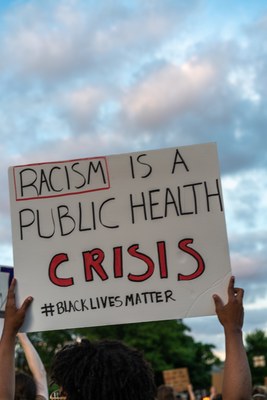SPHIS Home » News » Declaration of Racism as a Public Health Emergency
Declaration of Racism as a Public Health Emergency
By: Monica Wendel, DrPH, MA, Associate Dean for Public Health Practice, Professor and Chair of the Department of Health Promotion and Behavioral Sciences, Co-Director, Commonwealth Institute of Kentucky

The disproportionate impact of COVID-19, along with widespread protests for racial justice, is forcing a long overdue reckoning with the history of our country in general and Louisville specifically, and how that history has shaped the systems, policies, practices, collective narratives, and behaviors we exist with today. Many individuals and organizations have made statements to clarify their position regarding white supremacy, systemic racism, racial injustice, and police brutality. Although the words of solidarity are encouraging, the reality is that they must be followed with actions and change or they are just words…which our community has used to placate Black and Indigenous people of color (BIPOC) throughout history.
Now must be different. The criminalization of Blackness and state sanctioned violence against Black people must be dismantled. The words without actions play is not fooling anybody. In Louisville, this is evidenced in the ongoing protests for #JusticeForBreonna and the full-throated public indictment of Mayor Greg Fischer and Louisville Metro for their slow, tone-deaf, and inadequate responses, despite the efforts of some local leaders. The mayor’s words and lack of action continue to result in further death, trauma, and destruction of community. Failure to act on the side of justice has cost the lives of David McAtee and Tyler Gerth and further alienation and traumatization of the Black Louisville community. These wounds fester. If we want healing, we have to choose it and do the work.
First, we must learn the reality of history. Race is an invented construct. There is no scientific basis for race – it was created specifically for the purpose of oppression and justifying slavery and white supremacy. This country was born of and is steeped in racial violence. From genocide to colonization to slavery to indentured servitude to sharecropping to Jim Crow to redlining to insidious laws and systems to mass incarceration. And to consider these issues is both inherently political and inherently apolitical. These issues are so often framed as political issues (right vs. left; conservative vs. progressive) to shift the focus and avoid having to actually address the issues themselves. However, these are fundamentally moral issues, driven by what we believe about the value and inviolable rights of human beings, as well as who qualifies as human and thus deserving of those rights.
Racism is a public health emergency. The field of public health touts its foundations and grounding in social justice, but we are not innocent. Racism is a pandemic that has been driving inequitable morbidity and mortality for centuries, and public health has done little to “remove the handle from the pump.” As the field’s understanding of social ecology, structural and social determinants, and root causes deepens, we must sharpen the focus of our actions to address them.
Justice is a prerequisite for health equity.
This requires action at all levels. What do we do as individuals? What do we do as social groups? What do we do as organizations? What do we do as communities? What do we do as societies? As suggested by Dr. Ibram X. Kendi, we are either racist or anti-racist; there is no middle ground. Silence is choosing a side. Complacency is choosing a side. Ignoring the issue is choosing a side. Deflecting attention from the issue is choosing a side. As stated by Paolo Freire, “Washing one’s hands of the conflict between the powerful and the powerless means to side with the powerful, not to be neutral.” In line with Freirean philosophy, whether we recognize it or not, systemic injustices dehumanize us all. He argues that every single person seeks fulfillment that is achieved by becoming more fully human. My participation in the dehumanization of others—whether directly or by my silence—inhibits my progress toward becoming more fully human. If I allow my good fortune to blind me to the suffering of others, we are both dehumanized. If I allow my privileged position to callous my soul against systemic injustice, I am dehumanized. And the dehumanization of any of us in a community robs us all of the tremendous potential that exists when the humanity of every individual is honored and liberation is achieved. As stated by American poet Emma Lazarus in 1883 and later echoed by Dr. Martin Luther King, Jr., Fannie Lou Hamer, and Maya Angelou, “Until we are all free, we are none of us free.” All means all. Let us not mistake our privilege for freedom. Let us not mistake our comfort for freedom. Let us not mistake our wealth for freedom. Let us not mistake our patriotism for freedom.
My humanity is bound to yours, my liberation to yours, whoever you may be. Because of that, I commit to actively seeing, acknowledging, and elevating your humanity in any way that I can, however uncomfortable or risky that may be. I commit to listening, especially when it’s hard. I commit to not looking away. I commit to being open to critical feedback in my pursuit of becoming more fully human. I personally commit —as a faculty member, a mentor, a research leader, a department chair, an associate dean, an institute director—to embedding justice and equity into the processes and structures and content of whatever I influence with my position and power.
Specifically as public health professionals, we must engage in praxis. We must listen to the voices of our fellow humans in pain. Their pain isn’t new. They have been telling us the need to fix all of this for years—we just haven’t listened. We must critically reflect on our own thoughts and actions, and based on what we find, think and act in ways that promote justice and healing.
For those of us who benefit from whiteness, we must consciously de-center our own experiences—in humility, realizing that our experiences should have never been considered the norm or the standard. We must bear witness to the realities of others’ lives. De-centering myself means recognizing that my experience is one of many that make up the whole of humanity, not the one by which others’ experiences should be assessed as weird or abnormal or uncivilized. We must acknowledge and re-create our systems of power that advantage some and exploit others. We must relinquish our proclivity to white saviorism and paternalism toward the communities we have hurt. And we must institutionalize all of this into the way we educate ourselves and others, both in the structures of our institutions and in the focus and content of what we teach. The mission of our field is to advance equity. To do that, we must choose to use our power and platforms to demand and pursue justice.
SPHIS Dean Craig Blakely moderated a discussion on racism as a public health issue. Dr. Monica Wendel and Trinidad Jackson, MS, MPH, Senior Research Associate, Office of Public Health Practice, participated in this discussion. Click to view a recording of the event.






